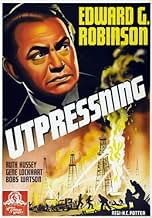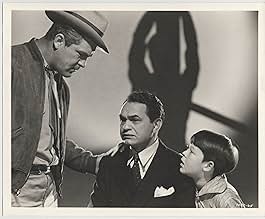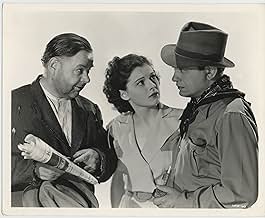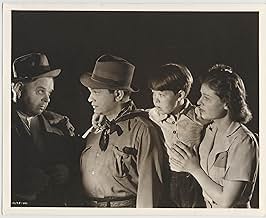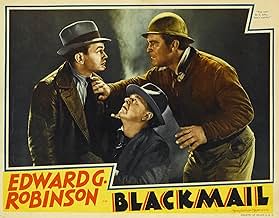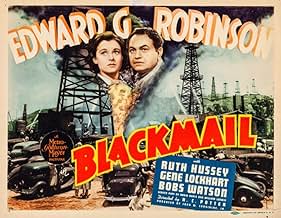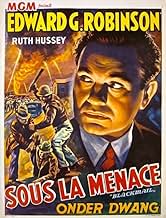Añade un argumento en tu idiomaJohn Ingram, successful oil field firefighter, is really a chain gang escapee. Someone out of his past finds him.John Ingram, successful oil field firefighter, is really a chain gang escapee. Someone out of his past finds him.John Ingram, successful oil field firefighter, is really a chain gang escapee. Someone out of his past finds him.
- Dirección
- Guión
- Reparto principal
Guinn 'Big Boy' Williams
- Moose McCarthy
- (as Guinn Williams)
Lew Harvey
- Workman
- (escenas eliminadas)
Mitchell Lewis
- Workman
- (escenas eliminadas)
Ted Oliver
- Workman
- (escenas eliminadas)
Lee Phelps
- Guard
- (escenas eliminadas)
Trevor Bardette
- Southern Deputy
- (sin acreditar)
Willie Best
- Bunny - the Janitor
- (sin acreditar)
Stanley Blystone
- Oil Worker
- (sin acreditar)
Wade Boteler
- Police Sergeant
- (sin acreditar)
Ed Brady
- Prisoner Worrying About Dick Tracy
- (sin acreditar)
Reseñas destacadas
Poor title for what is a movie patterned on "I Was A Fugitive From A Chain Gang." It would appear that some of the shots were either taken from that masterpiece or re-done virtually identically with new cast. Edward G. Robinson is presented in the Paul Muni role but this time the hero has been willfully framed -- not wrongfully convicted. This framing is necessary for the rest of the story line and the plot unfolds as believable. Gene Lockhart steals the show in his portrayal of the villain. Robinson never looks as gaunt as Muni and is less convincing as someone who has suffered on the chain gang. Watching Robinson's rotund body run through the swamps just doesn't hack it. If given a choice, see the Muni movie but this one will serve for those who prefer a different ending. A better title might have been "Vengeance."
Back in the mid-1930s, Warner Brothers came out with a shockingly brutal and absorbing drama about the evils of chain gangs. Paul Muni's performance and the script for "I Was a Fugitive From a Chain Gang" were superb and the film has held up great over the years. Because of this, films like "Blackmail" seem incredibly bland and pale in comparison.
When this MGM film begins, John Ingram (Edward G. Robinson) is a successful and well respected man whose job it is to put out oil fires. Unfortunately, he's also a fugitive from some Southern chain gang-- an innocent man who couldn't prove this but managed to escape. Since then, assuming a new identity, he's gone on to make a productive life and a nice family. However, when a scumbag (Gene Lockhart) comes to town, Ingram is in trouble. While he's just asking for a job, this guy is a crook and is the guy who is actually responsible for the crime Ingram was arrested for years ago.
So far, while the plot is hard to believe, it is worth seeing. What happens next, however, sure strains credibility way past the breaking point. The scum-bag EASILY convinces Ingram that he is willing to own up to his crime but only if he gets a huge payoff. In other words, he'll admit to the crime but escape--leaving evidence that will clear Ingram's name. Not at all surprisingly (since he IS a crook), he tricks Ingram and it's Ingram who is sent to prison. Duh.
For the rest of the film, Robinson spends his time in prison. However, the chain gang is run by a bunch of brutes (though they are FAR less brutal than the guys in the earlier film) and eventually he realizes he must escape in order to ever see his family again.
So why does this film earn a 5? Well, it is entertaining but it breaks absolutely no new ground and pretty much neuters the old plot. The chain gang, while unpleasant, doesn't seem all that bad and instead of this form of imprisonment being indicted, the film actually is all about capturing the real baddie and sending him to prison where he rightfully belongs. Amazingly poor considering the material.
When this MGM film begins, John Ingram (Edward G. Robinson) is a successful and well respected man whose job it is to put out oil fires. Unfortunately, he's also a fugitive from some Southern chain gang-- an innocent man who couldn't prove this but managed to escape. Since then, assuming a new identity, he's gone on to make a productive life and a nice family. However, when a scumbag (Gene Lockhart) comes to town, Ingram is in trouble. While he's just asking for a job, this guy is a crook and is the guy who is actually responsible for the crime Ingram was arrested for years ago.
So far, while the plot is hard to believe, it is worth seeing. What happens next, however, sure strains credibility way past the breaking point. The scum-bag EASILY convinces Ingram that he is willing to own up to his crime but only if he gets a huge payoff. In other words, he'll admit to the crime but escape--leaving evidence that will clear Ingram's name. Not at all surprisingly (since he IS a crook), he tricks Ingram and it's Ingram who is sent to prison. Duh.
For the rest of the film, Robinson spends his time in prison. However, the chain gang is run by a bunch of brutes (though they are FAR less brutal than the guys in the earlier film) and eventually he realizes he must escape in order to ever see his family again.
So why does this film earn a 5? Well, it is entertaining but it breaks absolutely no new ground and pretty much neuters the old plot. The chain gang, while unpleasant, doesn't seem all that bad and instead of this form of imprisonment being indicted, the film actually is all about capturing the real baddie and sending him to prison where he rightfully belongs. Amazingly poor considering the material.
Almost 30 years before John Wayne did his tribute film to Earl 'Red' Adair the famous fighter of oil fires, Edward G. Robinson starred as a man with an oil fighting company, married to Ruth Hussey and with a son in little Bobs Watson. But in Black mail he's a fugitive from a chain gang being convicted of a robbery he didn't commit and escaping. Robinson keeps a low profile, as low as he can, but it isn't the law that spots him.
No it's Gene Lockhart and he knows him from when the robbery was committed. It was when both were in the navy and Lockhart was the real thief, but got scared and the money from the ship's purser which he stole in Robinson's bunk.
Now the scurvy little sneak develops a new scheme after first ingratiating himself with Robinson asking for a job and then rats him out with an exchange for a confession. You have to see how this works and I can't believe Robinson fell for it, but Lockhart gets control of an oil well that Robinson has a lease on and Robinson goes back to the chain gang.
Gene Lockhart made a career of playing all kinds of rat roles, but he really tops himself in Blackmail. You will love seeing how he gets his in the end.
The chain gang scenes are copied well from the classic film from Robinson's home studio of Warner Brothers. Chain gangs are as bad as they were when Paul Muni was serving on them and he too was framed for the crime he was sentenced for by circumstance. There's also a nice supporting part for Guinn Williams as Robinson's lunkhead assistant who has a good heart and actually proves valuable to him.
Fans of Robinson will like Blackmail it holds up well after almost 75 years.
No it's Gene Lockhart and he knows him from when the robbery was committed. It was when both were in the navy and Lockhart was the real thief, but got scared and the money from the ship's purser which he stole in Robinson's bunk.
Now the scurvy little sneak develops a new scheme after first ingratiating himself with Robinson asking for a job and then rats him out with an exchange for a confession. You have to see how this works and I can't believe Robinson fell for it, but Lockhart gets control of an oil well that Robinson has a lease on and Robinson goes back to the chain gang.
Gene Lockhart made a career of playing all kinds of rat roles, but he really tops himself in Blackmail. You will love seeing how he gets his in the end.
The chain gang scenes are copied well from the classic film from Robinson's home studio of Warner Brothers. Chain gangs are as bad as they were when Paul Muni was serving on them and he too was framed for the crime he was sentenced for by circumstance. There's also a nice supporting part for Guinn Williams as Robinson's lunkhead assistant who has a good heart and actually proves valuable to him.
Fans of Robinson will like Blackmail it holds up well after almost 75 years.
Here's to You Mr. Robinson. Even when Slightly Miscast and Upstaged by the Villain Edward G. managed to put Verve and Gusto in any Role. Here he goes from Family Man to a Rage Filled, Revenge Seeking Psycho Hell Bent on Saving His Family and Fortune from a Slimy and Totally Repugnant former "Friend".
There are some Minor Cringe-Inducements mostly at the Beginning with some Comedy Relief and Smarmy Family Stuff, but Once the Blackmailer Shows Up Things Kick into Overdrive and there are some Very Effective Chain Gang Scenes and a Suspenseful Escape.
The Oil Fires are Realistic and this is one of the Few Times that MGM tried to be Gritty and Deliver a Message. They were Aping Warner Brothers and did a Pretty Good Imitation.
There are some Minor Cringe-Inducements mostly at the Beginning with some Comedy Relief and Smarmy Family Stuff, but Once the Blackmailer Shows Up Things Kick into Overdrive and there are some Very Effective Chain Gang Scenes and a Suspenseful Escape.
The Oil Fires are Realistic and this is one of the Few Times that MGM tried to be Gritty and Deliver a Message. They were Aping Warner Brothers and did a Pretty Good Imitation.
Edward G. Robinson here is a victim of "Blackmail," a 1939 film starring Robinson, Ruth Hussey, and Gene Lockhart.
Ingram (Robinson, his wife (Hussey) and his son (Bobs Watson, known as the "Crybaby of Hollywood") live in Oklahoma, where Ingram fights oil fires He's considered one of the best. But he has a secret - nine years earlier, under another name, he was on a chain gang for something he didn't do, and he escaped.
All is well until William Ramey (Lockhart), someone from his past, shows up and blackmails him, using the promise of getting Ingram cleared, since it was he who committed the crime. However, he double crosses Ingram, who ends up back on a chain gang.
Ingram decides that this time, he will do his full sentence. Things happen to change his mind.
Gritty drama with Robinson suffering as only he can. Like Bogart, he could be mean as dirt or a sympathetic character. Here he's tough, caring, and sympathetic. Ruth Hussey gives a lovely performance as his wife, and I admit that Bobs Watson was so pathetic when he cried that I cried. He became a Methodist minister but kept acting as well.
Though the acting is effective, this is a routine drama. The actors keep you involved.
Ingram (Robinson, his wife (Hussey) and his son (Bobs Watson, known as the "Crybaby of Hollywood") live in Oklahoma, where Ingram fights oil fires He's considered one of the best. But he has a secret - nine years earlier, under another name, he was on a chain gang for something he didn't do, and he escaped.
All is well until William Ramey (Lockhart), someone from his past, shows up and blackmails him, using the promise of getting Ingram cleared, since it was he who committed the crime. However, he double crosses Ingram, who ends up back on a chain gang.
Ingram decides that this time, he will do his full sentence. Things happen to change his mind.
Gritty drama with Robinson suffering as only he can. Like Bogart, he could be mean as dirt or a sympathetic character. Here he's tough, caring, and sympathetic. Ruth Hussey gives a lovely performance as his wife, and I admit that Bobs Watson was so pathetic when he cried that I cried. He became a Methodist minister but kept acting as well.
Though the acting is effective, this is a routine drama. The actors keep you involved.
¿Sabías que...?
- CuriosidadesThis film received its USA television premiere in Los Angeles Friday 16 November 1956 on KTTV (Channel 11), followed by Philadelphia Monday 19 November 1956 on WFIL (Channel 6); it first aired in New Haven CT 3 December 1956 on WNHC (Channel 8), in New York City 15 December 1956 on WCBS (Channel 2) , in Portland OR 2 January 1957 on KGW (Channel 8), in Chicago 16 January 1957 on WBBM (Channel 2), in Altoona PA 15 April 1957 on WFBG (Channel 10), in Minneapolis 1 May 1957 on KMGM (Channel 9), in Abilene TX 20 May 1957 on KRBC (Channel 9), in Phoenix 28 July 1957 on KPHO (Channel 5), in Memphis 5 August 1957 on WHBQ (Channel 13), in Miami 14 August 1957 on WCKT (Channel 7), in Tampa 1 October 1957 on WFLA (Channel 8), in Cincinnati 2 November 1957 on WLW-T (Channel 5), in Columbus 23 November 1957 on WLW-C (Channel 3), in Indianapolis 9 December 1957 on WLW-I (Channel 13), in Fresno CA 16 December 1957 on KMJ (Channel 24), in Honolulu 3 January 1958 on KHVH (Channel 13), and in San Francisco 20 January 1958 on KGO (Channel 7).
- PifiasWhen John returns home after escaping, he pulls down the shade on the window over the kitchen sink, but leaves it a few inches above the windowsill, then embraces his wife. In the next close-up of the embrace the shade is fully closed down to the sill.
- ConexionesFeatured in From the Ends of the Earth (1939)
Selecciones populares
Inicia sesión para calificar y añadir a tu lista para recibir recomendaciones personalizadas
Detalles
- Fecha de lanzamiento
- País de origen
- Idioma
- Títulos en diferentes países
- Raskidani okovi
- Localizaciones del rodaje
- San Pedro, Los Ángeles, California, Estados Unidos(oil field sequence)
- Empresa productora
- Ver más compañías en los créditos en IMDbPro
- Duración
- 1h 21min(81 min)
- Color
- Relación de aspecto
- 1.37 : 1
Contribuir a esta página
Sugerir un cambio o añadir el contenido que falta

